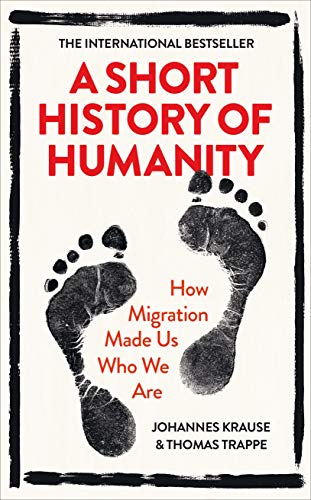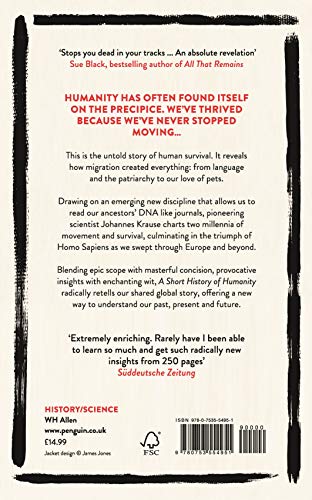


A Short History of Humanity
C**T
Too Woke
This is a book about science, specifically archaeogenetics, a new science. It's a coffee table book, written for lay people and it is based on real science, it has notes but is not referenced because it's not a scientific paper. Nothing wrong with coffee table books, as a former scientist I've seen a lot of snobbery about popular science, but I find such books pleasant, non taxing ways to take a glimpse into other fields. It has a lot of good information but...my enjoyment has been marred by the feeling that I'm being preached at, I'm being told how I should think. It's awash with terms such as ' descrimination against women' , 'patriarchal' , 'inequality'. It's loaded with 21st century social justice ideology and virtue signalling. While every book must inevitably reflect the ideological fashions of it's day I feel good sound science should speak for itself and a reasonable attempt at objectivity should be made. I feel that quoting Donald Trump's inane ranting is inappropriate in this context. If you like your new information to come from the Committee for Correct Thinking you'll love this book. Admittedly I'm a cranky old bat, a strong independent woman who elbowed my through a male dominated career while raising a son alone, which means I don't take kindly to being guided in my philosphy when I study prehistory. Apologies to the authors, take it as constructive criticism.
S**H
Excellent Non Fiction and a Delightful read
Excellent write up substantiated with Facts and Findings. Absolutely easy to read. Anyone who has studied basic Science and Humanities would be able to understand.
J**R
Best Book I have read on the subject
Well structured and tech explanation understandable
A**O
Molecules tell many tales
Less than a month ago I reviewed "The Oxford Illustrated History of Prehistoric Europe" (Barry Cunliffe) on Amazon.com and lamented its lack of genetic content: "What we need is a new version of this book that integrates all that archeology with all that genomics!" But "things are moving so fast on the genomics front that such a book will inevitably be obsolete before it sees the light of day."Right on cue, here is such a book--sort of."A Short History of Humanity" is misleading without the subtitle, "A New History of Old Europe," because this is not a history of humanity but rather of the portion of it inhabiting mainly the prehistoric and early historic Europe and the Near East. (The Near East could not be excluded because it is absolutely pivotal to the story.) Krause is an "archeogeneticist," a profession that did not exist 20 years ago; he was trained by Svante Paabo, the creator of the discipline. "A Short History" is almost as lopsidedly genetical as "The Oxford History" is lopsidedly archeological. While it flags numerous points where genetics has revised or even supplanted the history assembled from archeology, it does not explain the contradictions in a manner that permits any deep synthesis. But then, the genomic picture is evolving constantly even as we read. This book assumes one or the other of two things is true: Either the reader is already well-versed in the narrative derived from archeology, or he/she doesn't care about it and only wants to be au courant. The book I want to read gives a deeper synthesis and seemingly remains to be written.The main focus of the book is the critical role of migration in human history. It examines the cultural and linguistic consequences of migration as well as the genetic, but keeps the genetics in the driver's seat. The attempt to compare genetic and linguistic evolution in time and space was pioneered by L.L. Cavalli-Sforza, whose name never appears once in this book. Similarly, the casual reader would conclude that the attempt to construct a linguistic evolutionary metric akin to the molecular clock used in genetics begins with the author's research cohort. In fact, there are two previous attempts going back many decades-- glottochronology and lexicostatistics (both are reviewed nicely by Daniel Nettle in his book "Linguistic Diversity"--highly recommended); the method sketched here is a more modern updating but like the older ones is subject to criticism as to what words or stems are chosen for analysis. It may be an old man's bias, but in science as in politics I think it is terribly shortsighted to focus entirely on where we are today, rather than trying to understand how we got there.The most interesting and novel chapter concerns the interplay of population movements and epidemic or pandemic disease. The progress in paleogenetics of pathogens (recovered from human remains or contaminated artifacts) in recent years is astonishing, and in some cases upends what has been the conventional wisdom more or less since the days of Zinsser's classic "Rats, Lice and History." The interplay of historic selection for plague resistance and contemporary preadaptation to pathogens is a rapidly-evolving subfield with major public-health implications. Krause doesn't mention some of the mysterious transient plagues in European history, like the"Picardy sweats" and the "English sweats," but clearly we might be in a position to learn what they actually were, if suitable interments can be identified and mined for pathogen genomes.The closing chapter is rather annoyingly didactic, preaching the importance of migration and the obsolescence of any genetic concept of "race," ethnicity, or (!) nationhood. It shouldn't be necessary to say these things given where the science has taken us. But there are still people who believe that the last word on the subject was written by Madison Grant in "The Passing of the Great Race" (1916), one of the most noxious works of pseudoscience and pseudohistory ever published. So the didactic language may be annoying, but it is still needed and the need may be particularly pressing for a geneticist working in...Germany.And while Krause and Trappe do discuss Basque genetics--though not very much--they have nothing new to say about why the Basque language is so profoundly strange. Molecules don't seem to have helped on that one.
R**Z
Interesting but Disappointing
I found this book interesting but ultimately disappointing. It is an attempt to bring the initial conclusions of the ‘new science of archaeogenetics’ to a popular audience. It is one thing, however, to popularize complex material and another to write a scholarly book about complex material in an accessible way. Great scholarly writers like Jacques Barzun and Peter Gay, e.g., wrote sophisticated, weighty, scholarly books for popular audiences. This is not a weighty, scholarly book (though it is interesting).Essentially, the book tells the story of migration patterns (of people and of pathogens, e.g.) utilizing genetic evidence. The most memorable sections are the account of Anatolian farmers moving through the Balkans into Western Europe--displacing the hunter/gatherers there--and the account of pathogens reaching South America via seals, thus depicting the interchanges between indigenous peoples and colonizer/conquistadores with regard to yaws and syphilis. The bottom line is that the real world is more complicated than that depicted by ideologues of all stripes. The information on the Denisovans is quite interesting and the ability to detect pathogens in the DNA of thousands-of-year old bones is very instructive and gives us new insights into the periodization and etiology of past plagues.The problem is that this is heavy on the genetics and light on the archaeology/anthropology/mythology. To give one example, the discussion of the movement from proto-indo-european to discrete indo-european languages is interesting in the discussion of the pivotal importance of Iran, but the tiny bibliography fails to note the magisterial work on the subject by J. P. Mallory, a dizzying display of erudition and an Everest-sized accumulation of raw facts. With regard to Anatolia, the pivotal departure date of the farmers is set at 8,000 years ago, but no mention is made of the glacial melt which resulted in the rising of the Mediterranean and its crashing through the Sea of Marmara and the Bosporus, turning the Black Lake into the Black Sea. The devastating flood which resulted (perhaps the ultimate source of the Noah story) destroyed populations in Anatolia and encouraged migration. This event is generally dated at 7,600 years ago and may ultimately be related to the spread of Indo-European as the Anatolian farmers moved up the great rivers of Europe. This event is depicted in the splendid book by the Columbia scientists, William Ryan and Walter Pitman.Equally disappointing is the tendency to moralize in the spirit of political correctness. We are told, e.g., that humans are natural wanderers and that nationalist support of secure borders is shameful; President Trump’s name is invoked in this regard, but with no distinction whatsoever between legal and illegal immigration. The glory days of Ellis Island are always remembered fondly, but without any attention to the requirements concerning good health. Similarly, there were strong concerns expressed with regard to the criminal element within the Marielitos. It is simply not fair to think of a barely-populated Europe of wandering farmers or hunter/gatherers and jump to comparisons with contemporary policy. There were no members of MS-13 among the Anatolian farmers.Bottom line: an interesting popular book, but much more of an introduction to archaeogenetics than ‘a short history of humanity’, particularly one told with virtually no attention given to art, culture, religion and mythography.
Trustpilot
1 month ago
4 days ago